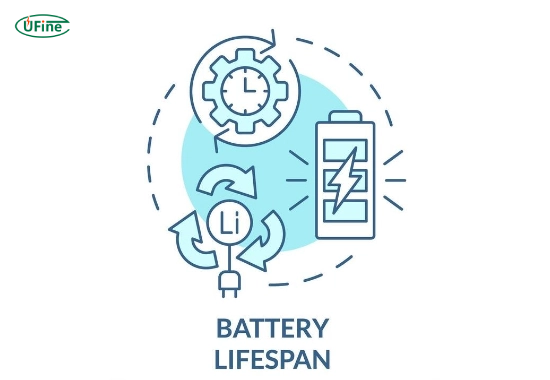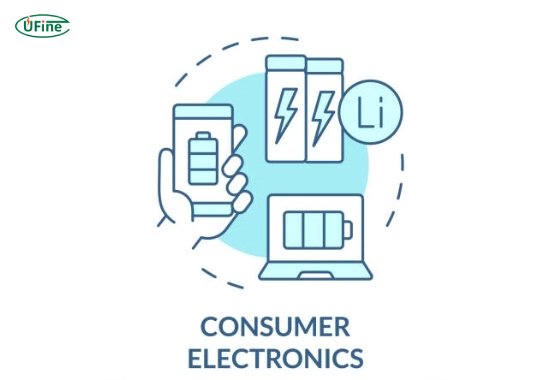
- Part 1. What is a battery drain calculator?
- Part 2. Why is calculating lithium battery runtime important for daily electronics?
- Part 3. How does a battery drain calculator work?
- Part 4. Real-life example: Charging a smartphone with a power bank
- Part 5. Real-life example: Running a laptop with a lithium battery
- Part 6. Real-life example: Portable projector for outdoor movie night
- Part 7. Common electronics and their typical power consumption
- Part 8. Factors that affect real-world battery runtime for electronics
- Part 9. Using a battery drain calculator for multiple devices at once
- Part 10. FAQs about battery drain calculator
How do you use a battery drain calculator to predict how long a lithium battery will power your electronic devices?
A battery drain calculator helps you estimate how long your lithium battery can run any electronic device before it needs recharging. Whether you’re camping with a portable fan, working remotely with a laptop on battery power, or managing a power bank for your smartphone, knowing your battery runtime helps you avoid the stress of a sudden power-out.
In this article, we’ll break down how to use a battery drain calculator in real-life daily situations, from charging your phone to running a mini-projector. By the end, you’ll know how to confidently calculate and plan your battery usage like a pro.
Part 1. What is a battery drain calculator?
A battery drain calculator is an online tool or formula that estimates how long a battery will power a specific device. It considers the battery’s capacity (in watt-hours or amp-hours) and the device’s power consumption (in watts or amps).
Battery drain calculators are especially useful for:
- People living off-grid
- Digital nomads working from laptops
- Travelers using portable electronics
- Campers using solar panels and battery banks
- Homeowners with backup power systems
No matter your lifestyle, this simple tool helps you plan your energy use.
Part 2. Why is calculating lithium battery runtime important for daily electronics?
Why should you calculate the battery runtime of your everyday devices?
To avoid power interruptions, protect your battery, and manage your usage efficiently.
Real-life examples:
- You’re working from a coffee shop and want to know if your laptop will last 6 hours
- You’re camping and need to run a USB fan overnight
- You want to binge-watch Netflix on a tablet using a power bank
- You’re using a wireless router for remote work and must ensure it stays powered
Knowing the battery runtime helps you:
- Plan ahead
- Avoid surprises
- Pack the right gear
- Extend your battery’s life
Part 3. How does a battery drain calculator work?
Battery drain calculators use this basic formula:
Battery Runtime (hours) = Battery Capacity (Wh) ÷ Device Power Consumption (W)
If you only know amp-hours (Ah), convert like this:
Battery Capacity (Wh) = Battery Capacity (Ah) × Battery Voltage (V)
Example:
You have a 10,000mAh (10Ah) power bank rated at 5V.
You’re charging a smartphone that draws 10 watts.
- 5V × 10Ah = 50Wh
- 50Wh ÷ 10W = 5 hours runtime
Your power bank can run the phone for around 5 hours, assuming no other losses.
Part 4. Real-life example: Charging a smartphone with a power bank
Let’s say you own a smartphone that uses 9 watts while charging. You want to know how many full charges you can get from a 20,000mAh power bank (5V output).
Step 1: Convert mAh to Wh
20,000mAh = 20Ah
20Ah × 5V = 100Wh total capacity
Step 2: Estimate phone charging energy
Average smartphone battery = 3,000mAh at 3.7V
3.7V × 3Ah = 11.1Wh per charge
Step 3: Divide capacity by device needs
100Wh ÷ 11.1Wh = ~9 full charges
Result: You can charge your phone about 9 times before the power bank is drained.
Part 5. Real-life example: Running a laptop with a lithium battery
You’re working remotely with a 60W laptop. You use a 12V, 100Ah lithium battery with an inverter.
Step 1: Convert battery to Wh
12V × 100Ah = 1,200Wh
Step 2: Account for inverter loss (85%)
1,200Wh × 0.85 = 1,020Wh usable
Step 3: Divide usable capacity by laptop power
1,020Wh ÷ 60W = 17 hours
Result: Your laptop can run for about 17 hours continuously if no other devices are plugged in.
Part 6. Real-life example: Portable projector for outdoor movie night
Projectors are popular for outdoor movie nights. Let’s say you have one that consumes 40W, and you use a 300Wh lithium battery pack.
300Wh ÷ 40W = 7.5 hours
So, you’ll get approximately 7.5 hours of movie time, enough for 3 full-length films.
Part 7. Common electronics and their typical power consumption
| Device | Power Consumption (W) |
|---|---|
| Smartphone (charging) | 5 – 10W |
| Tablet | 10 – 15W |
| Laptop | 40 – 100W |
| USB Fan | 2 – 6W |
| LED Light | 5 – 15W |
| Mini Projector | 30 – 50W |
| Portable Wi-Fi Router | 5 – 10W |
| Bluetooth Speaker | 10 – 20W |
Use these values to estimate runtime with any battery.
Part 8. Factors that affect real-world battery runtime for electronics
Even with a calculator, real-world performance varies because of:
- Battery age: Older batteries lose capacity
- Temperature: Cold weather reduces efficiency
- Inverter losses: Converting DC to AC loses energy
- Background power usage: Devices may draw more than rated
- Battery management systems (BMS): May cut off earlier to protect the battery
Always plan for a 10–15% buffer in your calculations to stay safe.
Part 9. Using a battery drain calculator for multiple devices at once
Can a battery drain calculator handle multiple electronics?
Yes, just add up the total power draw and divide your battery’s capacity by that number.
Example:
- Laptop: 60W
- Phone: 10W
- Wi-Fi Router: 10W
- Total = 80W
Battery = 1,200Wh
Runtime = 1,200Wh ÷ 80W = 15 hours
This is ideal for remote workers, van lifers, and digital nomads.
Part 10. FAQs about battery drain calculator
How to calculate how long a power bank lasts when charging a tablet and phone together?
To find out, add the power draw of both devices. For example, if a tablet draws 15W and a phone draws 10W, the combined load is 25W.
For a 100Wh power bank:
100Wh ÷ 25W = 4 hours of simultaneous use.
Can I run a portable Wi-Fi router all day on a lithium battery bank?
Yes, but you need to check the router’s wattage. If it uses 6W and your battery is 300Wh:
300 ÷ 6 = 50 hours runtime.
So you can run it for over 2 full days without charging.
How many hours will a 12V lithium battery run my desk fan and laptop during a power outage?
Add both loads together.
Laptop: 60W, Fan: 10W → 70W total
If your 12V battery is 100Ah:
12 × 100 = 1,200Wh
1,200 ÷ 70 = ~17 hours of use
What size battery do I need to run a mini projector and Bluetooth speaker for a 6-hour outdoor party?
Estimate total load:
Projector = 40W, Speaker = 20W → 60W
6 hours × 60W = 360Wh
So, you’ll need at least a 400Wh battery to be safe.
How to choose the best battery drain calculator for portable electronics?
Look for calculators that allow custom input for battery voltage, device wattage, and efficiency settings. Tools that offer multi-device support and discharge efficiency options are best for electronics users.
Related Tags:
More Articles

고방전 배터리는 높은 전류와 발열로 배터리수명이 줄어듭니다. 구조적 한계, 사용 패턴, 충전 습관 등 실제 수명 단축 요인을 체계적으로 분석했습니다.
Capacitor vs Battery: What is the Difference?
Capacitor vs battery explained in detail. Learn the difference between capacitor and battery in energy storage, charging speed, lifespan, and real applications.
18650 Battery vs AA: Which Is Better for Your Device?
Compare 18650 vs AA batteries in capacity, voltage, rechargeability, and applications. Learn which battery type fits high-drain or everyday devices.
What is the Difference Between Battery Cell, Battery Control Module, and Battery Pack?
Compare battery cells, modules, and packs. Learn functions, design differences, control modules, and selection tips for EV, ESS, and industrial use.
How to Prevent LiPo Battery Explosion?
Can LiPo batteries explode or catch fire? Learn key causes of LiPo battery fires and proven charging, storage, and handling tips to reduce explosion risk.




